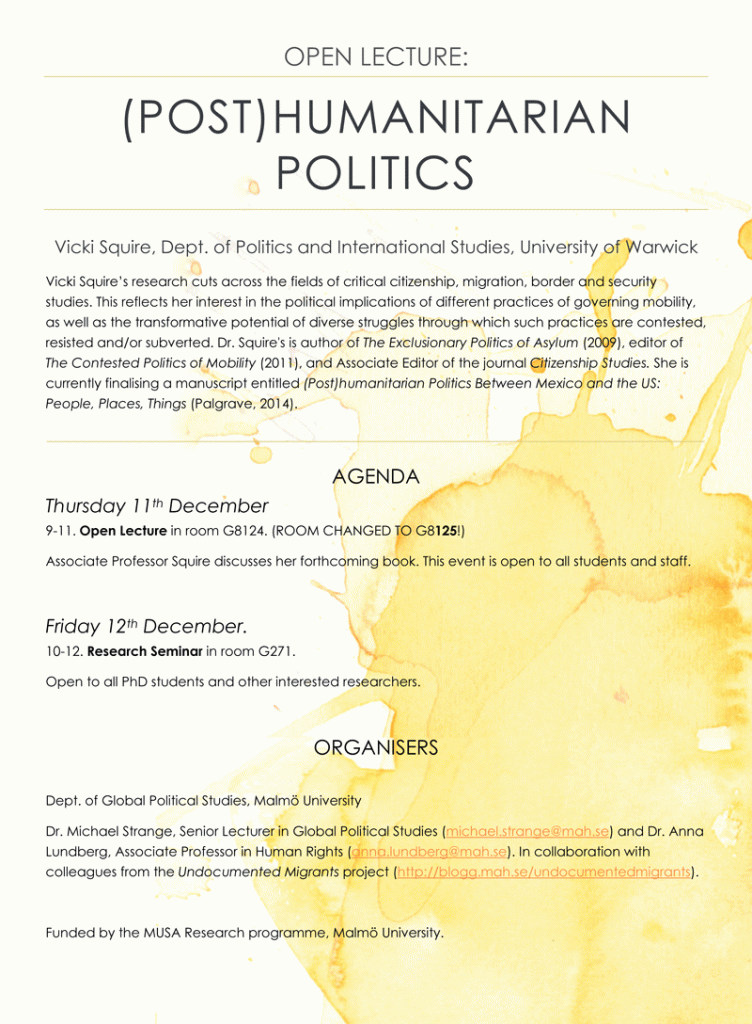A windy day in April during the last week of my PhD fieldwork in Birmingham, I took one of the undocumented families I have been getting to know on a day-trip to the beautiful seaside city of Aberystwyth, Wales. The seven-year-old daughter was cheerfully throwing rocks into the sea all afternoon as if she never wanted to do anything else. She was also happy that she now would have something fun to tell her class about what she did during her Easter break when she comes back to school. Back in the outskirts of Birmingham, a single mother of two children spent the day panicking and feeling depressed on the sofa in her friend’s house, which she probably soon will be kicked out of. They were also supposed to come on the trip, but the day before the mother received a letter where the Home Office asked the family to attend a meeting a few weeks later. Unsure of the true meaning of this meeting she could not help but imagine the worst. She knows that she could apply for a British passport for her twelve-year-old daughter who was born in Britain and who has never been anywhere else, but where would she find the 700 pounds for the application fee? As yet another rock was put on her shoulders the burden was too heavy for her to bring on a three-hour train trip to Wales, so she chose to stay home. Her daughter would not have anything to tell her class after the school break.
The parallel processes in society of being hard against migrants but soft towards children creates an absurd situation for undocumented children. Society gives them rights with one hand through school and other local support, but slap their parents admonishingly in the face with the other, accusing perfectly capable parents of bad parenting just because they have not managed to fit into the narrow categories of deservingness within the immigration system. Living in a world where a BBC documentary about seven year old children migrating to Europe alone is considered not suitable for British children under 16 to watch, or where the Home Office insists on telling a five-year-old the details of the family’s immigration case just so that the Social Services later will accuse the parent of talking to the kid too much about their immigration issues, it is not hard to feel bewildered about how to write about an issue that is so extremely politicised. As Costas Douzinas put it: “Human rights have only paradoxes to offer”.
But how can we understand state sanctioned suffering? The hostile environment that Theresa May, UK Home Secretary, is creating is aimed to be a ”push-factor” towards ”illegal immigrants”. What I have seen in my fieldwork this winter is that it rather should be called a ”crush-factor”. Her hostile environment is making life hell for children, most often born in the UK, who have never migrated anywhere. A manager within one of the local children’s services in the West Midlands told me that, in practice, all of the families they give emergency support for being destitute because of their immigration status get leave to remain in the end. None of the families I have met have any plans of going anywhere. Why do Theresa May then still want to make life hell for these children?
In my research I compare what it is like to grow up as a child in the UK and Sweden respectively while being labelled an “illegal immigrant”. One example of a key difference is how the information sharing between the local authorities and the Home Office is hindering families to claim the rights the Children’s Services are legally entitled to give them, such as emergency accommodation and food when they are destitute, whereas in Sweden the Social Services are not allowed to share information with the Migration Board in general. The spontaneous reaction would be to say that Sweden then must be a better place to experience irregularity as a child, but this would not represent the complex exclusionary structures that are constructed in similar ways in all western neoliberal nation-states. The state’s interest is the primary consideration in immigration matters, almost always trumping the best interest of children, both in the UK and Sweden. In the Swedish case a much more effective bureaucracy creates exclusionary effects that one can argue eradicate the assumed benefits of a more generous legislation towards illegalised children on paper.
In the end most of the families in both countries get their papers if they endure enough time for the migration authorities to recognise that it is in the best interest of the child to stay. Therefore, the UK born nine-year-old girl who refuses to call herself African even though her parents are from Ghana (she has never seen anything else than the UK and English is her only language, ”why should I not be British?” she asks me), and who makes the Social Services worry for her (she has to be prepared for the eventual case of being deported to Ghana, they say) becomes an involuntary political subject because of her politicised position in the conflict over children’s identities and futures which characterises the struggle over the irregular situation of children in the UK and Europe today.
/Jacob Lind, PhD-student at Malmö University

